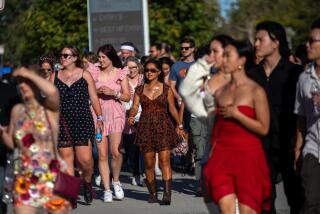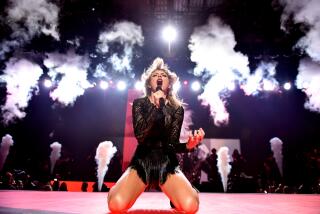Seats filled with mystery
- Share via
BEIJING — Tickets were in such short supply for Friday night’s field hockey match between Australia and Pakistan that some relatives of players couldn’t get any, and those who did had to fork over as much as $130 apiece. At the box office, clerks told disappointed ticket seekers that the game was “sold out.”
But inside the 17,000-seat Olympic Green Hockey Stadium, the stands were a sea of blue -- the color of the rows and rows of empty plastic seats. When the game began, only a quarter of the seats were filled, leaving an incredulous Donna Dancer, wife of Australian hockey coach Barry Dancer, to ask, “Where have all the tickets gone?”
It’s one of the great mysteries of the Beijing Olympics: In what is reportedly the first sold-out Games in Olympic history, many venues are far from full, with the expanses of empty seats giving events a somewhat forlorn appearance.
“Everyone I know wanted tickets; we Chinese love to see sports,” said Mike Ma, 34, a Beijing office worker who scored a field hockey ticket through a German friend because he was unable to buy one in China. “It’s a pity there are so many empty seats. We would like to know who is responsible.”
And how it happened.
Demand for the 6.8 million tickets has been crushing. When tickets first went on sale, online ticketing sites around the world crashed because so many people were trying to buy. When the final batch of tickets was offered in July, Chinese fans waited in 90-degree heat for as long as two days to buy them, with near riots breaking out at many locations.
“This is our fourth Olympics, but getting tickets to this one really has been a nightmare,” said Stacey Watson, a 44-year-old Australian, as she watched her country beat Pakistan, 3-1. “Then you get inside and you wonder who got all the tickets, because there is nobody there.”
Dancer, wife of the Australian coach, knows how tough it was to scrape together tickets for the players’ families. She and others spent long nights trying to get through to jammed Internet sites. They called dodgy ticket agencies, scalpers and people they barely knew begging for tickets. About 300 of them finally got tickets, scattered around the stadium.
Not every venue is empty. There have been full houses for swimming and gymnastics finals. The 91,000-seat National Stadium, known as the Bird’s Nest, was packed Saturday for track and field. But at most other events, even table tennis and archery in which the Chinese are strong, the lack of fans is glaringly obvious, especially on TV.
Beijing Olympic organizers initially explained away the empty seats by citing the humid and rainy weather on the first days of the Games. But with the skies clearing, they have begun complaining about tickets that have been purchased but gone unused.
“All the tickets have been sold out; we will be encouraging all the ticket holders to watch the matches themselves,” Wang Wei, executive vice president of the organizing committee, said Friday at a news conference. “If they don’t want to go, they should give the tickets to those who do,”
Empty seats are a chronic problem at the Olympics, where large blocks of the best seats are set aside for sponsors, VIPs and media members who may not use them. The 2004 Athens Games were marked by vast swaths of empty seats.
But Athens was not sold out, and people could buy tickets at the on-site box office. Not so in Beijing. With no same-day tickets available, hundreds of people mill about outside the wire fences that separate the Olympic Green from the street, looking for tickets. Scalpers slink through the crowd, muttering their prices and avoiding police.
On Saturday morning, the cheapest price to see U.S. swimmer Michael Phelps in the 100-meter butterfly race was $570, for tickets with a face value of $21.
One reason for the shortage is that organizers wanted to make the Games accessible to China’s 1.3 billion people, so they sold more tickets domestically and at lower prices than usual, some for as little as $4. The low prices encouraged people to snap up whatever they could.
But it turns out there weren’t that many people truly prepared to spend their Monday morning watching Mali play New Zealand in women’s basketball.
Also, the custom in Communist China is to attend sporting or cultural events as part of official work outings. Large blocks of empty seats in the cheaper nosebleed sections of the stadiums may have been allocated to state companies that ended up not using them.
From the looks of the stands, the empty seats do not appear to be tickets that were sold in the United States, Australia or Europe, said Mark Lewis, president of Jet Set Sports, the affiliate of CoSport, which was the official sales agent. In the cases where foreigners decided not to go to China, their tickets were returned and resold.
“I know where our seats are. . . . The people who bought our tickets are attending,” Lewis said.
So many foreigners have complained that the Chinese have been busing in rent-a-crowds to lend the stands a festive atmosphere.
“It’s better. Nobody likes an empty stadium,” said Dave Andrews, 27, of Perth, Australia. “But you can tell they’ve just been brought in here to fill the seats. They know nothing about hockey. They cheer at all the wrong times.”
--
More to Read
Go beyond the scoreboard
Get the latest on L.A.'s teams in the daily Sports Report newsletter.
You may occasionally receive promotional content from the Los Angeles Times.






